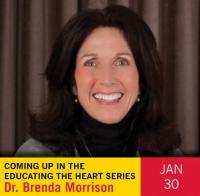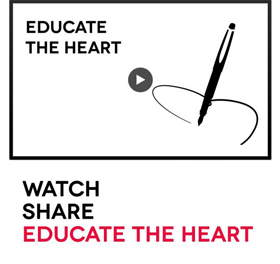Q & A with Dr. Brenda Morrison - Talking About Bullying

As a new year unfolds, the Dalai Lama Center’s Educating the Heart series rolls on. First up for 2013 is Dr. Brenda Morrison, Director of the Centre for Restorative Justice and assistant professor with Simon Fraser University’s School of Criminology. Dr. Morrison is one of Canada’s leading advocates for Restorative Justice, a process that puts the onus not on punitive measures, but on addressing the needs of the victim or victims. Restorative justice is a controversial and sometimes misunderstood concept, one that Dr. Morrison will discuss in her lecture on January 30th, at SFU’s Segal Graduate School of Business.
Dalai Lama Center: What are some of the common misconceptions about Restorative Justice?
Dr. Brenda Morrison: The two most common misconceptions are (1) that restorative justice is the soft approach to harmful behavior in schools and (2) restorative justice should not be used for serious incidents of harmful behavior where there are power imbalances, such as bullying behavior.
DLC: It seems that people from all strata of life -- the media, academia, even the entertainment field -- are acknowledging that bullying is not merely a fact of life, but something truly harmful to society. How will we know if all the anti-bullying speech and campaigning is succeeding?
BM: Yes, we need to follow up with people to see if our interventions and initiatives are working. Good intentions are not enough. Indeed, meta analyses of a number of intervention programs show marginal results in addressing bullying and victimization in schools. I will be talking about this in my talk and proposing a framework to re-evaluate the problem of the harmful effects of bullying in school.
DLC: Bullying is often painted as something between children and teenagers, but isn't the problem far more complex?
BM: Absolutely, bullying is about power and control at all levels of analysis – micro to macro – and in all social domains – family, school and otherwise. Everyone needs to stand up to bullying in school communities – students, teachers and parents.
DLC: Should all public schools adopt a restorative approach to discipline?
BM: I would encourage all members of the school community to learn more about restorative justice and build an understanding around the framework and the practice. One step at a time – developing understanding comes first and to think about how it could work in a particular school or context.
DLC: Are recidivism rates a fair gauge of whether a Restorative Justice program works or not?
BM: Recidivism rates are one indicator of change but not the only, and perhaps not the best. Measures of school climate are much better indicators, as they measure the relational health of the school.
DLC: You have done a great deal of work on the subject of violence in schools. What went through your mind as you watched news of the events in Newtown, Connecticut last December?
BM: My heart felt very heavy the moment I heard the news; their pain became mine. My thoughts and feelings went out to the families and the community. As a mother myself, it was hard to fathom the devastation of the news. The school rampage shootings are a symptom of deep unrest, both at an individual level and a social level.
DLC: Can incidents such as Newtown ever be deterred? Is it possible that someday we can predict when a situation like Newton might occur?
BM: Yes, when we make the shift to thinking about schools as places to practice community values, such as compassion, inclusion, dignity and respect. Healthy communities know when someone needs support; there is also a strong level of accountability in healthy communities.
DLC: Do you feel that the mainstream media is doing a decent job of getting information about Restorative Justice to the public? How has social media been useful in promoting the idea of restorative justice?
BM: I think the tide is turning. The CBC, among others, has provided some great coverage locally and nationally. Restorative justice was featured in a great article in The New Yorker this month, and The Walrus had a great article too. There is a feeling of readiness that I have not felt before. Social media has been very helpful, with lots of great tweets everyday about restorative justice. And we have our own Vancouver TedX on restorative justice that was released in December.
DLC: If your audience takes home only one thing from your talk, what do you hope that will be?
BM: Through the wisdom of compassion and the courage to stand up we can create communities of care in our schools, and move beyond the ongoing problems of passive bystanders and not addressing the deeper issues underlying bullying behaviour. We need to nurture communities where everyone feels valuable, powerful and needed.
For more information about the Educating the Heart Series click here.








Comments
Post new comment